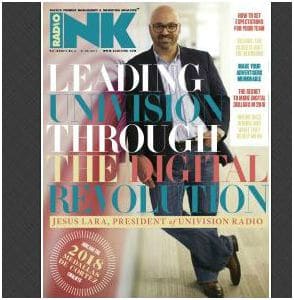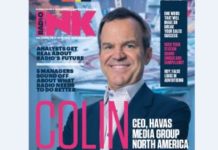
In January 2017, Jesus Lara was named president of Univision Radio. With his long and successful career in music and media — with a specific emphasis on digital — Lara is definitely the right person to lead Univision at this time. We live in a world where consumers are enamored with everything digital, every teenager wants to be the next social media superstar, and every man, woman, and child lives life through the screen of a smartphone. It’s also a well known fact that the Hispanic community skews very high when digital and social media usage is measured.
Lara was hired to run the radio division at Univision after working at SBS, where he focused on that company’s digital initiatives. At Univision Lara not only leads the radio business, he’s also tasked with strategy development and implementation of Univision’s digital, content creation, programming, and entertainment efforts within radio.
Lara launched his media career with EMI as senior marketing manager, heading the label’s international music efforts in Latin America. It was then on to MTV, leading international music marketing and talent strategy. The young trailblazer then launched a tech company in Silicon Valley. The goal of that company was to use premium content and technology to create a product that helped people learn new languages. Unfortunately, like many other tech startups, Lara’s had to close shop.
SBS called Lara back in, and, for three years, he worked on their digital and digital streaming strategies before the move to Univision to lead the radio division.
Radio Ink: How and why did you choose media and broadcasting as a career?
Lara: I started my career in the core music business. I managed artists for several years as a young adult. I worked at the labels — for eight years I was running the Latin America and U.S. Hispanic A&R marketing arms for EMI Music. From there I transitioned to media. I went to Viacom and spent another nine years there, first in New York, overseeing the music marketing and talent strategy department for Viacom International. I was servicing all the MTV, VH1, and Nickelodeon channels outside the U.S. with their music and talent needs. From there I went to a tech startup I founded in Silicon Valley and spent three years there, immersing myself in the whole tech world.
Upon my return, I got my first job in radio specifically, although I had a lot of experience in media, particularly cable TV. I worked for three years developing SBS’s digital strategy, primarily focused around their digital audio streaming project. Last year I came across this opportunity, and it allowed me to put together a lot of things I learned throughout my career — the passion and emotional connection with music, trying to tie the knot between the digital and technology strategies, developing programming, and finding as much compelling talent as possible.
Radio Ink: How did you like managing artists and working at the labels?
Lara: It was very different times. There wasn’t as much fragmentation. There were a lot of gatekeepers. MTV was king, and terrestrial radio was the primary means by which to break artists. It was an amazing experience. It allowed me to get a front-row seat at the entire music ecosystem. I dealt with labels, publicists, agents, publishers, concert promoters. It really gave me the full breadth of what the music business was, back when we were still selling CDs.
Radio Ink: What was it like starting your own tech company?
Lara: It was amazing. It was in many ways probably the most rewarding experience of my life. It was a tech startup I put together after spending eight years at EMI and eight years at MTV, where I saw how youth audiences around the world used music, TV, and film content to informally learn English.
We put together a framework around that language-learning process and built this attractive layer on top of content that would allow users to consume video content. You’d look at a music video or TV episode, and you had a simultaneous translation of the dialogue, and interactivity over that translation; you could click a button and it would help you pronounce it. We tried to create a formal structure around this informal language-learning process that happens across the world.
Radio Ink: Is the company still active?
Lara: It is not. It is one of those tech startups that ran out of money, and we were not able to fulfill our vision. We learned a ton and met incredible people, and that prepared me for the new tasks that I’m heading now.
Radio Ink: You mentioned radio was the way to break artists back then. Is radio still the primary way to break artists?
Lara: Without a doubt. It’s the only medium that gives you enough frequency to break through the clutter. There are other alternative paths in this day and age, like social media, which is big, and streaming services are big. Radio is the only one that gives you the frequency, and hits are created with frequency. That has not changed.
Radio Ink: Have you taken all that tech knowledge you gained and applied it to your current position?
Lara: Absolutely. It’s very much a work in progress. It’s been a year now, and this past year has been about taking stock in what we have available to us. We’re going to be putting a lot of our plans into action this year. You’ll start to see a lot of investment in technology and the rolling out of tech-specific products.
Radio Ink: How is the Hispanic format doing?
Lara: It’s doing great. Radio continues to be a passion-driven medium. We nurture a two-way connection with our audience on a daily basis. We have the largest radio shows in Spanish language. We have BMF (El Bueno, La Mala, y El Feo, which translates to The Good, The Bad, and The Ugly), which is by far the biggest show in our roster and in the country. We have dominant shows in both L.A. and Miami. We can’t complain. We are looking for ways to leverage technology to enhance that emotional relationship our listeners have with our personalities and our shows.
Radio Ink: Since you’ve taken over the Univision Radio division, what is the biggest takeaway regarding performance?
Lara: They say that success isn’t getting to do well, it’s being able to sustain doing well, and my job is to make sure we can sustain our success. We have had an incredible run at Univision Radio. We have been fortunate to have huge shows that are not just number one in Spanish-language, but in some cases number one general-market. Our goal is to sustain our leadership position across the 16 markets we’re in and, more importantly, try to expand the markets where our shows air.
We’re specifically looking at expanding El Bueno, La Mala, y El Feo, our number one regional Mexican morning show, and El Freeguey, our recently launched p.m. drive regional Mexican show, among several others. We want to invest in technology as well, to expand our brands on to new platforms and make sure we are available anywhere our audience wants to consume us.
Radio Ink: Is there one particular market where Hispanic media is really shining?
Lara: It’s hard to pick one. We’re in 16 markets, and we have a leadership position in the vast majority of them. Some markets — Los Angeles, Miami, New York — are highly competitive. Fortunately, Hispanic audiences have transcended beyond the traditional five or six markets. In the markets we are in, we see a very vibrant, very active Hispanic community.
Radio Ink: Do you see growth opportunities in all of your markets?
Lara: Absolutely. It’s a combination of local, national, network sales, and experiential activities we are looking to get more involved with, as well as digital extension of our brands.
Radio Ink: Has American politics affected revenue in any way?
Lara: I think American politics in our current state has made everybody come together in ways they haven’t in the past — particularly our company, which is mission-driven. We have a bottom line, so we have a responsibility for our business, but a major responsibility to our community. We are happy to take that on. Like any transition, there are ups and downs, but the current political climate has made our community come together in ways they have not in the past.
Radio Ink: What is the biggest misconception when positioning Hispanic radio to potential advertisers?
Lara: They come and go. There are a few clients who choose not to buy Hispanic for whatever reason. We believe that’s to their detriment. The Hispanic audience will continue to be the engine for growth to most companies that are servicing the totality of America. It’s our job to make sure we can put forward a compelling story. Fortunately, our numbers don’t lie.
Radio Ink: Do you feel the advertisers are listening to your pitches and giving you a fair opportunity to compete?
Lara: Many of them are. I think some are still on the fence. We’ve been able to flip many, and we want to have an opportunity to present to those advertisers who have doubts about the Hispanic community and what the Hispanic consumer can do for their products.
Radio Ink: Hispanics are some of the biggest consumers of digital and social media. How are you using that to your advantage?
Lara: It’s a great advantage we have over other demographics. We overindex on mobile consumption and on social media use, so those are two critical data points that enable us to more firmly work on brand extension efforts. That will be a big part of our efforts this year, as I mentioned.
Radio Ink: Is it Instagram, Facebook, Twitter, all of the above?
Lara: It is all of the above. Facebook, with their recent algorithm tweaks, will force not just radio companies, but all media companies, to rethink how they approach Facebook. Instagram continues to be a huge source of audience engagement, Twitter to a smaller extent.
Radio Ink: What can Hispanic radio do better to market its product?
Lara: We’re looking at ways to further enhance the relationship we have with our audience. Like all media companies, there comes a time when you sit behind your desk too long and don’t get out on the streets to touch your audience in more meaningful ways. We’re looking to get out and do that, be it through events or other types of street promotions. That’s one thing that radio continues to do that differs from other media, and we need to double down on some of those street touchpoints.
Radio Ink: For years radio executives have been saying we need to tell a better story to get revenue growing again. How do we do that?
Lara: If you’re defining radio as radio broadcast through FM transmitters in cars, I think it has reached a point of max output. We have to look at radio not just as a media company, but as an IP and data company — that’s what we’re going for. We’re looking at our shows and talent as IP — that we obviously position across traditional platforms to the extent possible — but look for ways to extend that IP onto digital platforms, experiential platforms, and possibly third-party licensing opportunities. We have to look at the business not just from a traditional media viewpoint, but as an IP-holding entity that gets transmitted across multiple touchpoints.
Radio Ink: Do you have an opinion on what the CBS/Entercom merger means for the industry?
Lara: We wish them well. If they do well, it’s a sign of continued success with other media. I think they will have to look at some of their market strategies and see where they have holes. They will be a formidable competitor, and we wish them well.
Radio Ink: Are you worried about the changing technology in the car and where radio’s place might be in the future?
Lara: Sure — that’s one thing that keeps radio executives up at night. The car dashboard is just one way by which people consume us. We have to look for ways to extend our touchpoint to the audience. We have to be on mobile phones, devices, smart TVs, everywhere the audience is. We can’t just rely on a single access point.
Radio ink: Is podcasting a real business that can generate revenue for radio?
Lara: We are bullish on podcasting. It allows us to superserve the long tail, to go deeper into certain topics and things we couldn’t on a broadcast platform. Last year we launched Uforia on demand as a destination. We have a number of healthy podcasting shows. We are looking to double down on podcasting. You will see us get involved with more podcasters moving forward. It allows us to give the talent an outlet they wouldn’t have otherwise.
Radio Ink: Do you have your talent doing podcasts to keep listeners engaged throughout the day?
Lara: We’re giving our talent the opportunity to go into deep themes and topics that they wouldn’t be able to talk about on air. For example, we have one talent out of San Diego who’s a big gamer. He wanted to do a podcast on gaming. We allowed him to do that. We have other talent that want to speak about their families, and we allow them to do that. It allows us to go deep into certain content verticals that wouldn’t necessarily work on a broadcast medium.
Radio Ink: How is Uforia doing?
Lara: Good. We are going to be relaunching a new product with enhanced features and interactivity. We are very bullish on our direct-to-consumer touchpoint.
Radio Ink: Are you happy with the number of stations Univision has?
Lara: I think there’s always an opportunity for growth. If there’s the right opportunity, I’m sure we would look at it, but it has to make sense for the company. Overall, we’re happy with the portfolio we have right now. We’re trying to maximize its potential. Most stations do extremely well, other stations need to be repositioned. We are looking at our station mix across the country.
Radio Ink: What are the most popular Hispanic formats, and why?
Lara: By far the most popular is Regional Mexican. That’s the format that has the largest number of stations in the most markets. That’s a reflection of historic immigration trends to the country, and we’re fortunately the dominant player in Regional Mexican.
Following that, and growing quickly, is Latin Rhythmic — what a lot of people today would call Latin pop music, which is contemporary Latin music that primarily derives from reggaeton, EDM, and other urban sounds. That format has exploded in popularity, has gained new fans — and not just Spanish-speaking fans. Latin rhythmic music has exploded on a global level. You’re seeing a lot of non-Spanish speakers develop an affinity for this genre; it is very exciting to us.
We have a large portfolio of stations that play Latino AC oldies, songs that have captivated Hispanic audiences for decades. We program a great mix of Latin classic songs for those audiences.
Radio Ink: What is your biggest challenge?
Lara: We have challenges across multiple fronts. We have traditional competitive media challenges as well as competition with technology peer players. We’re going to double down on technology this year, and revamp our app. We also have challenges in developing new revenue streams. We are focused on doing that. The new revenue streams are going to come through experiential activation, programming extensions on new platforms, and leveraging the overindexing of Hispanics across the digital products and touchpoints.
Radio Ink: If you had a chance to talk to the 40 Most Powerful People in Radio, what would you like to see them do better for the radio industry?
Lara: We cannot be afraid of technology. We have to embrace it and look for ways to leverage technology across many of our stations.
Radio Ink: What would you like our readers to know about Univision that they might not know?
Lara: Univision is not a traditional media company, it is a mission-driven company. We have two bottom lines, one to the owners and one to our community. We take that second bottom line very seriously and to heart in everything we do. What I want to convey to the advertising community is that they should rethink their Hispanic strategy. We are the place to go for a Hispanic strategy, and we are open and willing to help any advertiser that wants to connect with our audience.
Radio Ink: Why are you the place to go?
Lara: We have the largest radio footprint. We also have an incredible insights and research department that’s been doing research for decades. There isn’t a single industry in this country that understands how the Hispanic consumer behaves better than Univision.
Radio Ink: What would you like our readers to know about you?
Lara: I’m privileged to work in this company and to have the team that I have. We are very, very hungry to succeed, and we are going to be putting our best foot forward this year.








